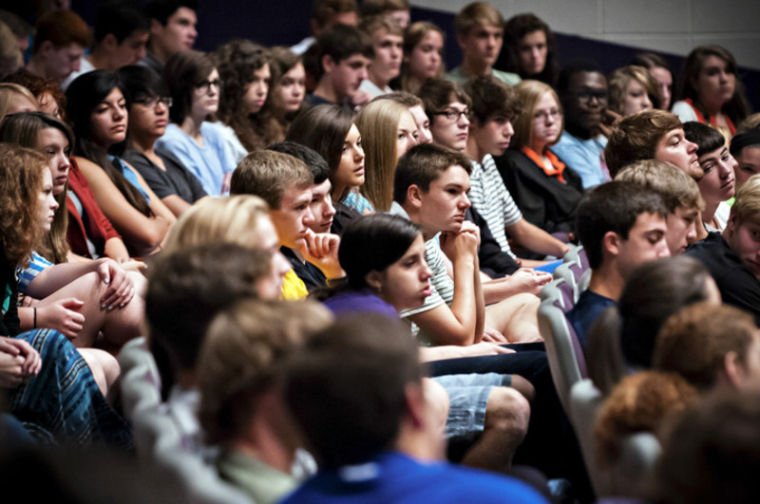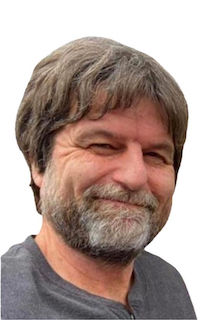Voter ID, Egypt among topics
Published 11:40 am Friday, August 16, 2013

- Students listen as U.S. Sen. Rand Paul, R-Bowling Green, talks to seniors Friday, Aug. 16, 2013, at Bowling Green High School. (Photo by Miranda Pederson/Daily News)
Voters should produce an ID before casting their ballot, U.S. Sen. Rand Paul, R-Bowling Green, told students this morning at Bowling Green High School.
“I don’t think showing your ID is a racial thing. It’s an intrusion. But we need to be diligent,” Paul said, nothing that there are 11 million people in the United States who aren’t citizens.
Trending
Paul spoke to an audience of predominantly seniors and other students in political science classes. As he always does with a student audience, he asked whether the U.S. is a democracy or a republic. He told them that if the U.S. was a democracy, 51 percent of the people could always tell 49 percent of the people what to do.
However, under a republic, there are other protections for citizens when government decides to do the wrong thing, he told the students. There are rights under the U.S. Constitution. And, government has done the wrong thing in the past – such as when Japanese-Americans were interred in camps during World War II, or when African-Americans faced “Jim Crow” laws, he said.
“It is important that we not glorify democracy, because we can make mistakes,” Paul said.
Paul said America’s goal to spread democracy throughout the world can be counterproductive.
“We may get things that we don’t ask for,” he said. A case in point is the ongoing violence in Egypt, a country to which the U.S. provides foreign aid. It’s a law, Paul said, that when a coup d’etat takes place, foreign aid must stop, regardless of the circumstances. He said the U.S. should obey the law when it comes to Egypt. Paul said he wants the aid stopped for two reasons – it’s bad policy to continue giving it, and “we don’t have the money.”
Paul said that in the time that he was at the school, the U.S. government borrowed about $100 million.
Trending
“We borrow $30,000 every second,” he told the students, adding that America owes China about $1 trillion, a debt that he described as a stack of money 67 miles tall.
Paul said tax dollars should stay at home because when the money gets to Washington, “the politicians don’t spend it as wisely as you do.” The U.S. government is $17 trillion “in the hole” and is spending money on services that the private sector can do better, he said.
“Government should do things that can’t be done by anyone else – such as national defense and infrastructure,” he said.
“Education shouldn’t be funded at the federal level. It should be funded on the state level,” he said, because local officials have a better handle on the needs than people in Washington “who are not close enough to the problem.”
Paul also talked about the issue of privacy and how the government can seize emails without a court order but it can’t seize the U.S. mail individuals receive. He said the students should be concerned that every cellphone call that they make is tracked by the government.
“I want to stop terrorists, but you can do it in a more appropriate way,” he said, noting a court order from a judge should be part of the process as probable cause is shown before the records seizure.
“Your data is being collected and stored in Utah. Not your content, but who you call. The law has gone the wrong direction,” he said, noting he’d like to see revisited court cases that established the government’s right to seize the records without a warrant following the Sept. 11 attacks.
“You don’t want the whole world to know about your personal life,” he said. “I think we are going to change this and go back to those cases.”
Paul also addressed the Affordable Care Act, so-called “Obamacare.” He said the government has gone about fixing health care the wrong way. Rather than mandating insurance for the 15 percent of Americans who don’t have it, and telling the insurers what has to be covered, the government should seek inexpensive insurance for that 15 percent. Policies with higher deductibles and more out-of-pocket expenses, creating more competition among insurers would drive health care costs down. On the other hand, government-mandated insurance coverage is more expensive, he said.
“He explained stuff well,” said BGHS senior Mahogany Love.
“It opens up my mind about the economy and other issues,” said BGHS senior Stephen Ruanto, who had Paul as his fourth-grade basketball coach. “He’ll still the same great guy. I’d like to see him run for president. I think he’d be a good president.”
Paul said when he first reached the U.S. Senate, veteran Arizona senator and former U.S. presidential candidate John McCain called him.
“He said the first six months you spend pinching yourself and wondering, ‘How did I get here?’ Then the next six months you spend wondering, ‘How the hell did the rest of them get up here?’ “
Paul said the U.S. has no monopoly on knowledge, and people in Congress aren’t any smarter than people in Bowling Green.
“One person can make a difference,” he said.
— Chuck Mason covers education for the Daily News. Follow him on Twitter at twitter.com/bgdnschools or bgdailynews.com.






